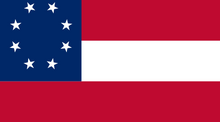
The official flag of the Carolinian Empire.
The Carolinian Empire or, simply Carolina, is an influential nation that occupies the southeastern corner of North America. It is by far the oldest country in the North American continent, as it is the only country in North America that managed to survive the Third World War.
Carolina's defining features are the country's arts scene (particularly in country music centred around Nashville), its strong adherence to Evangelical Christian policies and traditions and its cultural and political favouring of its British ethnic majority over the rest of its population. Prior to 1977, Carolina had maintained the institution of slavery within its shores, and, although it is now officially outlawed, the Jim Crow laws serve as an effective continuance.
At A Glance[]
Nation Name: The Empire of Carolina
Demonym: Carolinian
Capital: Atlanta, Georgia
Independence: July 4, 1776 (declared), May 12, 1784 (recognized): from Great Britain.
Population: (see list of countries by GDP)
Official Language(s): English
Government Type: Constitutional Monarchy (technically), Absolute Monarchy (in practice)
Head of State: Emperor Chet Miller
Head of Government: Emperor Chet Miller
Official Religion: None
Largest Religion: Christian Evangelicalism
Economy Type: Mixed
Currency: American dollar (US$)
Constitution: Yes, though parts are frequently ignored
Summer Time: Yes
Calling Code: +1
Internet TLD: .car
Maritime Boundary (nm): 24
Aircraft Code: CR
Military Strength: Fluctuates, but it stays mostly at 5% of the entire population
Military Capability Score (out of 100, rating by Worldwide Defence Trade Association (WDTA)): 80 (Good)
Technological Innovation Score: Military (WDTA): 80/100 (Good), Scientific (University poll): 80/100 (Good), Other (University poll): 60/100 (Average)
Economic Rating (by Standard & Poor): 80/100 (Good) (See list of countries by GDP)
Economic Freedom Index (by Standard & Poor): 85/100 (mostly free- some government regulation, mostly in terms of anti-monopolism and providing some assistance to the poor)
Health Care Rating (by Doctors Without Borders): 70/100 (Average)
Health Care System: Two-tiered, with support only going to impoverished individuals who qualify.
Political Freedom Index (by Reporters Without Borders): 70/100 (Average; freedom of expression and religion are guaranteed and upheld though at times curtailed, political dissent, however, is not allowed and is ruthlessly stamped out)
Drug Laws: Only drugs allowed are coffee and alcohol, all other substances are banned.
Gun Control: No restrictions placed on firearms.
Environmental Policy Rating (by Greenpeace): 65/100 (attention is paid to environmental concerns, but it can take a back seat from time to time)
Historical Overview[]
The country began as the Federated States of America when the Declaration of Independence was made against England on July 4, 1776. This was followed by the American War of Independence (known also as the "American Revolution") where fighting lasted until 1781 and was not officially finished until the Treaty of Paris was signed in 1783.
After successfully securing its independence, the FSA went on an ambitious expansion programme that eventually saw the Federation annex Mexico and Senegal by 1850, ushering in a ten-year period of unprecedented wealth and prestige where the country became known informally as the American Empire. Under President Cameron Wilbur, voted in for 1848, slavery was permitted and expanded across the entire Empire, with northern slaveowners drawing most of their new labour from the new territories the Empire acquired.
Despite the newfound prosperity, significant portions of the Empire opposed slavery, with the opposition eventually coalescing into the American Republican Party (also known as simply the Republicans or the "GOP", short for "Grand Old Party"). After the Republicans seemed poised to win the 1860 American election only to be denied by "dirty tricks" used by Joe Drexler (Wilbur's Vice-President and his hand-picked successor), the northern quarter of the FSA broke off as the United States of America (USA). This then precipitated the American Civil War (1861-65) which ended in victory for the USA following the direct intervention of Rome following the Capture of Thomas Scott.
In 1866, the FSA became the Carolinian Empire following the reorganization of America by the Peace of Madrid. Carolina's territories were reduced to the territories they possess now, but it was able to retain the institution of slavery which was favoured by the local population. The country's cotton plantations allowed it to quickly rebuild its economy, although the ascendancy of the USA due to Roman assistance meant that Carolina was never able to reassert itself as a dominant world power.
Slavery was Carolina's defining attribute, and successive Emperors would defend it against increasing international backlash. The Carolinians soon became isolated on the world stage, but this isolation only served to embolden the country and its defence of slavery. Carolinian participation on the side of the Triple Entente during World War I and alongside the Axis Powers in World War II as well as in the nascent League of Nations allowed it to gain some measure of influence and prestige on the world stage (gaining the colony of New Dixie along the southern African tip), although its support of slavery meant that the world almost always kept the country at arm's length.
The Edmonton Trials of the Falken Party served to sway public opinion against slavery. Martin Luther King, Jr., from Atlanta, spearheaded the campaign within Carolina and soon became an enemy of the state. Because King was nonviolent, Carolina's ruthless suppression of protests came to be seen in a different light, with revelations that Lee Harvey Oswald was a Carolinian operative proved decisive in leaving slavery to its fate within Carolinian borders. In 1978, Carolinian Emperor Jeb Lowry formally outlawed slavery within Carolinian borders, admitting that it was "a battle we cannot win".
Still, despite Lowry's decree, the Jim Crow laws were strengthened to ensure that Carolina's extensive non-Anglo-Saxon population couldn't gain any economic or political leverage within the Empire. It is often said that, within Carolina, slavery still exists- "just not technically". This sentiment has led to misconceptions that Carolina still allows slavery today, even though the laws expressly forbid it.
In the 1990s, the Third World War saw the collapse of the USA, Canada and California, leading to widespread riots and skirmishes that plunged North America into an effective anarchy. Carolina largely weathered this storm through the strong leadership of its current Emperor, Chet Miller (though Miller was forced to give up New Dixie), as well as its strong cultural unity owing to its religious population. Carolina became an influential member of the North American Union, allowing it to regain a measure of prominence and influence at the world stage, where it has signed numerous defence and economic pacts.
Governance & Culture[]
National Government[]
The head of state in Carolina is the Emperor who rules for life, with the incumbent being Chet Miller. The Emperor then appoints an Imperial Cabinet who serve as his advisors, among which is a Crown Prince who, by law, must be no older than 40 years of age at the start of his reign. Many Emperors appoint several Crown Princes and highlight a clear line of succession among the Princes to ensure a smooth succession.
The Emperor retains the sole power to create and enact laws, as well as to appoint all government officials at the national level. He is also the country's top judge and is thus the sole arbiter of the country's Constitution, which numerous Emperors have ignored where they saw fit to do so.
State Government[]
Carolina is divided at the subnational level into eight states- Alabama, East Carolina, North Carolina, South Carolina, Georgia, Mississippi, Tennessee and Virginia- each of which has a Legislative Assembly that is voted upon by the state's residents under varied laws. Each Assembly then appoints a Governor, who serves as the state's advisor to the Emperor. Although the Constitution grants Carolinians universal suffrage, the Emperor retains the sole authority to approve candidates for office as well as the official voter rolls, which are also often edited by the states themselves.
The Constitution also states that Carolina is officially secular and guarantees freedom of expression, speech and choice to its citizens, but, in effect, due to Imperial meddling, these rights are often curtailed. The strong influence of the Christian Evangelical movement within the region means many of Carolina's laws follow Evangelical principles, and, since the crowning of Joseph Canton in 1871, tradition has held that the Emperor is crowned at the First Baptist Church of Atlanta. Every Emperor was at one point a member of the First Baptist's congregation, with many even serving as senior pastors before their ascendancy to the throne.
Social classes[]
Although slavery is officially abolished, a tangled web of laws known informally as the "Jim Crow laws" (named after the title character in Thomas D. Rice's blackface performances) are in place in Carolina that effectively retains power in Carolinian society and politics in the hands of Carolina's British descendant population. Other European ethnic groups- such as the Romans, the Dutch and the Nordic- also tend to be culturally and politically favoured within Carolina, although it is not universal across the entire country. This is especially so with regards to the Romans, whom many Carolinians blame for their country's loss in the Civil War and its subsequent descent in power.
Culture[]
Carolina is known for its thriving artistic scene, particularly in regards to its country music scene based in Nashville, Tennessee as well as its own distinctive style of rock music known as "Southern rock", both of which has since gained worldwide followings. Gospel music, the contemporary form of Christian liturgical music, was at one point Carolina's dominant musical genre but it has since given way to the other musical groups described above. Nevertheless, the "Gospel" style of music that has since spread across the world has its origins in Carolinian Churches.
Carolina is also the last place in North America where minstrelsy and blackface shows are still put on regularly. Whereas the rest of North America has condemned the shows as "racist", the Carolinian population continues to show extensive support, with the industry turning a $270 million profit within Carolina in 2016.
